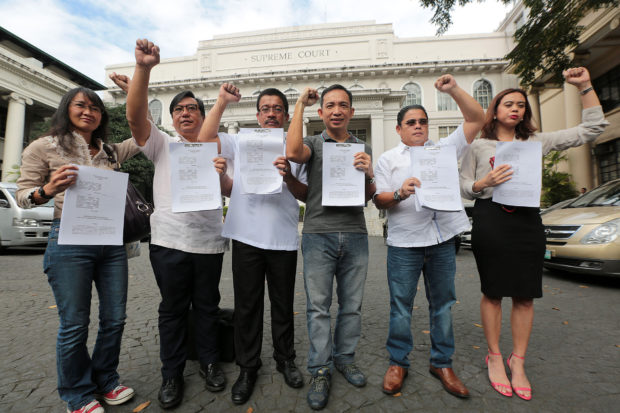Militant lawmakers ask SC to stop TRAIN

‘NO QUORUM’ Representatives Carlos Zarate (third, from left), Antonio Tinio and Ariel Casilao question theHouse ratification of the TRAIN law on the night of Dec. 13, 2017, claiming therewas no quorum during the voting. —GRIG C.MONTEGRANDE
A group of party-list representatives have asked the Supreme Court to strike down the new tax reform law, alleging “invalid ratification” by the House of Representatives.
ACT Teachers Rep. Antonio Tinio, Bayan Muna Rep. Carlos Zarate and Anakpawis Rep. Ariel Casilao said there was no quorum and voting when the House passed the Tax Reform for Acceleration and Inclusion (TRAIN) bill on the night of Dec. 13, 2017.
Solicitor General Jose Calida belittled the issue raised by the three lawmakers.
“Lack of quorum of Congress. Is that all you have to nullify the TRAIN law? Thank you, your honors, for making my job easier,” Calida said on Twitter.
Republic Act No. 10963, or the TRAIN Act, was signed by President Duterte last Dec. 19 and it took effect on Jan. 1. It lowers the personal income tax of salary earners but increases the excise on a host of goods and services, including fuel, cars, tobacco, coal, oil products and cosmetic procedures.
The three lawmakers, who belong to the Makabayan bloc, accused the House leadership of railroading the bicameral version of the tax reform bill “in the last three minutes” of that last day of session, before Congress went on Christmas break.
‘Unholy hour’
“The invalid ratification occurred at an unholy hour, unholy not only because of the lateness of the time but also because the ratification occurred under appalling, reprehensible circumstances,” they said.
They said other lawmakers, including House leaders, did not attend the session because they were outside the halls of Batasang Pambansa, while some partied at a five-star hotel.
“It was a case of a fictitious congressional act without the members of Congress themselves,” the militant lawmakers said, adding that the manner how the law was ratified violated House rules and the Constitution.
Tinio, Zarate and Casilao called the TRAIN Act a “grand deception,” insisting that the increase in excise taxes would result in higher cost of “food, water, electricity, everything” and therefore negate the higher take-home pay for wage earners.
“It will be felt by those who do not even have pay slips, but the farmer or fisherman who have to contend with higher costs of production and even by the unsalaried like a student or simple commuter,” they said.
Respondents
The militant lawmakers named Mr. Duterte, Speaker Pantaleon Alvarez, Majority Leader Rodolfo Fariñas, Deputy Speaker Raneo Abu and Deputy Majority Leader Arthur Defensor Jr. as respondents.
Tinio, Zarate and Casilao said they “tried to” exercise their duty as representatives during the last session day on Dec. 13, 2017, “but respondents deliberately refused to recognize such exercise when they railroaded the TRAIN that night.”
Since there was “no valid ratification” of the bicameral TRAIN bill, the three lawmakers argued, the President gravely abused his discretion in signing the law as RA 10963 on Dec. 19.
At the signing of the TRAIN Act, the President described it as “the administration’s biggest Christmas gift to the Filipino people, as 99 percent of the taxpayers will benefit from the simpler, fairer and more efficient tax.”
Starting Jan. 1, the TRAIN Act exempts from paying income tax workers earning less than P250,000 a year.














